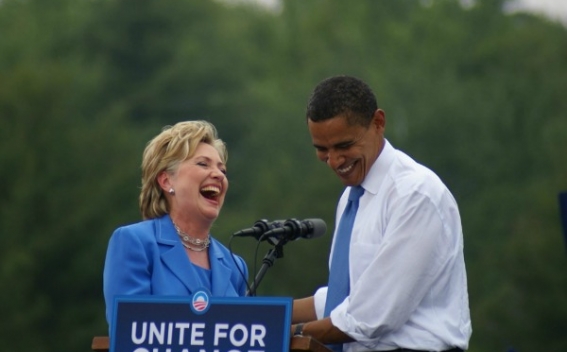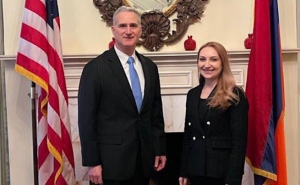Republican Dilemma: Trump or Democrats?

The media is full of articles with intriguing headlines, like "Trump and Clinton Victoriously March Forward," "Trump is Out," "Republicans Against Trump," "Clinton Attacks Trump," etc. Diversity and abundance of information on the US elections very often make the reader get confused and lose track of important developments. To avoid it, let’s sum up the diverse information disseminated in the media and make it clear at what stage the US elections are and what the chances of the main front-runners are.
So far, Democratic Primaries took place in 34 states and Republican Primaries in 33 states (Primaries are the first stage of the US elections, when each party elects its candidate to participate at the second stage of the elections, national elections). As a result, the delegates’ voices were allocated among the main candidates in the following way:
- Democratic candidates: Hillary Clinton got 1,712 of 2,383 needed, Bernie Sanders: 1,004 of 2,383 needed;
- Republican candidates: Donald Trump got 739 of 1,237 needed, Ted Cruz: 465 of 1,237 needed and John Kasich 143 of 1,237 needed.
What does the above mentioned data mean and what are the real chances of the main candidates to win primaries?
From Democrats, Sanders managed to win in the Alaska, Hawaii, and Washington last Saturday gaining the voices of 55 delegates as opposed to the 22 won by Clinton. However, the gap between the two candidates is still in favor of Hillary Clinton. To be able to catch up Clinton in the remaining eighteen states, plus the District of Columbia, Guam, Puerto Rico, and the U.S. Virgin Islands, Sanders need to secure about fifty-two percent of the remaining two thousand and seventy-three delegate votes. However, the experts do not consider the chances of Sanders to be high, bringing two main arguments: so far Sanders was successful in Caucasus type of voting (when the supporters of candidates do not go to polling stations but meet and debate, until one side wins), while in the remaining states the elections took place in close polling stations. Second, the remaining states mostly comprise of diverse population with Clinton enjoying the support of the minority votes, the New Yorker reports.
As for the Republicans, Donald Trump can win the voices of 498 of the delegates (still necessary for nomination) if he manages to gain more than half of the delegate voices in the remaining 18 states (10 of which are "Winner takes all states"). If he does not manage to gain the voices of the delegates, the second rounds of the elections are to be organized. In the second round, the delegates will be free to choose any candidate they wish irrespective of their previous choice. In this case the delegates of those candidates who have already left the election race will probably not be willing to defend Trump, which will lower the chances of Donald Trump to win the second stage of the primaries.
However, in this case Trump may choose to run as a free candidate, which cannot but split the voices of the Republicans in the second stage of the elections; a fact that will increase the chances for the Democrats to win in the national elections. This will mean that at certain point the Republicans can face a dilemma: either to support Trump or to lose the elections to Democrats. With such kind of developments ahead, one can state that the most interesting stages of the elections are still to come…
Other materials on this subject
- Around 25 Domestic Terrorism Cases Opened in US after Congress Storming About 25 cases of domestic terrorism were opened in the US following the unrest caused by supporters of US President Donald Trump in the Capitol building.
- Former New York City Mayor Mike Bloomberg Eyeing Presidential Bid He has not decided whether to run for president but is back to actively considering it and is taking this step to keep his options open.
- Putin: Trump Opponents Harm US with 'Invented' Russia Scandal Putin said the US opposition was not treating those who elected Mr. Trump with respect.
- Is Trump’s Replacement Realistic? However, how are the congressmen going to prove that Donald Trump is "incapacitated"?
- Will Putin-Trump Romance End Soon? ...to fully understand the logic of Trump’s policy towards Russia, it is helpful to get acquainted with the logic of deal-making introduced by Trump in his book entitled "The Art of the Deal'.
-
 17:08
17:08The regular session of the Anti-corruption Policy Council takes place in Jermuk
-
 15:05
15:05The Prime Minister sends congratulatory messages to the supreme leader of Iran and the President of Iran
-
 11:11
11:11Armenia sends earthquake aid to Turkey
-
 10:43
10:43Commemoration of the Pontiff St. Sahak Partev
-
 09:16
09:16Some roads are closed and difficult to pass in Armenia
-
 19:55
19:55Phone conversation of the Foreign Minister of Armenia with the U.S. Assistant Secretary of State for European and Eurasian Affairs
-
 18:30
18:30Prime Minister Pashinyan and President Khachaturyan meet
-
 18:20
18:20Ararat Mirzoyan with Co-Chairman of the OSCE Minsk Group of France Brice Roquefeuil
-
 17:01
17:01Humans could land on Mars within 10 years, Musk predicts
-
 16:45
16:45France, US urge 'immediate' end to Nagorno Karabakh blockade
-
 16:01
16:01Blockaded Nagorno Karabakh launches fundraiser to support quake-hit Syria
-
 15:59
15:59Earthquake death toll in Turkey rises to 18,342
-
 15:43
15:43Ararat Mirzoyan Held a Telephone Conversation with Sergey Lavrov
-
 15:06
15:06French president rules out fighter jet supplies to Ukraine in near future
-
 14:47
14:475 Day Weather Forecast in Armenia
-
 14:44
14:44President Vahagn Khachaturyan wrote a note in the book of condolences opened in the Embassy of Syria in Armenia
-
 14:20
14:20Azerbaijan’s provocations impede establishment of peace and stability – Armenian FM tells Russian Co-Chair of OSCE MG
-
 12:57
12:57France representation to OSCE: Paris calls on Azerbaijan to restore freedom of movement through Lachin corridor
-
 11:40
11:40Command of Kosovo forces highly appreciated preparation of Armenian peacekeepers
-
 10:16
10:16The United States withdrew from sanctions against Syria for six months the provision of assistance after the earthquake
day
week
month
Humidity: %
Wind: km/h









